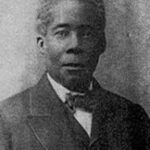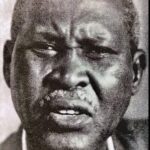VAN LARE, WILLIAM BEDFORD
- 7 Min Read
William Bedford Van Lare (September 7, 1904-September 3, 1969) was a prominent member of the Ghana (formerly Gold Coast) judiciary in the years immediately before and after independence was won in 1957. He played an influential role in the interplay between politics and the judiciary during this period, and was a Supreme Court judge, on occasion the Acting Chief Justice, and at one time acting governor-general of the Dominion of Ghana.

PHOTO CAPTION: William Bedford Van Lare . SOURCE: EAP Library
He was born in 1904 at Kpong, near Somanya, in the Manya Krobo district, on the west bank of the Volta river some 50 mi (80 km) northeast of Accra. His father was William Ludwig Van Lare, a merchant of Keta, the coastal port in the extreme southeast of what is now Ghana, and his mother was Wilhelmina Fiawonu Van Lare, also of Keta. On his father’s side he was descended from Nii Akrashie I, a chief of James Town, Accra. He was educated at the Bremen Mission School at Keta, and at Mfantsipim School in Cape Coast. Upon leaving Mfantsipim, he taught at government schools in Accra and at Obo, some 50 mi (80 km) east of Kumase, as well as at Mfantsipim. But he left teaching and went to England to study law. He entered University College, London, graduating LL.B. (bachelor of laws), and was called to the Bar at Lincoln’s Inn, London, in 1937.
Upon his return home in 1937 he worked in the law chambers of K. A. Bossman (later Mr. Justice K. A. Bossman), and made his name as an advocate. In 1943 he was appointed a magistrate by the colonial administration, serving in Cape Coast, Kumase, and Accra. In 1948 and 1950 he acted as chief registrar of the West African Court of Appeal. He also became chairman of the Magistrates’ Association. He was appointed a puisne (associate) judge in 1952, and by independence in 1957 had become one of the most senior of African judges. He was promoted to the Court of Appeal in 1957, after Kwame Nkrumah, then prime minister of Ghana, had been displeased with the stand taken by Mr. Justice S. O. Quashie-Idun, during a lawsuit which followed the deportation order served on two Nigerians from Kumase. Van Lare’s promotion forced Quashie Idun to resign from the Ghana Bench. This was the period when Nkrumah sought the cooperation of the judiciary, and obtained it from Van Lare, Sir Aku Korsah, and others.
Van Lare, however, could not for long see the judiciary treated high handedly without reacting. In October 1958, after a Ceylonese (a native of Ceylon, now Sri Lanka) named Savundra had become involved in questionable deals in Ghana, and a deportation order against him was challenged in the courts, the minister of the interior, Krobo Edusei, and the commissioner of police, Mr. E. R. T. Madjitey, were cited for contempt of court for deporting Savundra before the case could be decided. On the advice of Geoffrey Bing, an Englishman who was then attorney-general, a law was rushed through parliament to indemnify the minister and the commissioner. This action displeased certain members of the Bar and the Bench.
In December 1958, when Nkrumah was on a visit to India, Mr. Justice Van Lare, then acting chief justice, criticised the government for its treatment of the courts, and maintained that “the judges were in nobody’s pocket.” His bold stand, though displeasing to Nkrumah, nevertheless saved Nkrumah’s face before Prime Minister Jawaharlal Nehru of India (term of office 1947-1964), who was concerned lest the rule of law was vanishing from Ghana.
Van Lare was the chairman of the editorial board of the West African Law Reports from 1956-60, a member of the editorial board of the Ghana Law Reports from 1960-1963, and chairman of the board of examiners of the Ghana Law School from 1959-1963. He acted as chief justice on several occasions from 1957-1963, and was the acting governor-general of Ghana in January 1958. He served on various important commissions, including the Regional Constitutional Commission and the Representational and Electoral Reform Commission. He was a member of the Ghana branch of the International Law Association, of the International Commission of Jurists, and of the British Institute of International and Comparative Law. He was made Companion of the Order of St. Michael and St. George (C.M.G.) by the British government in 1960, and was also decorated by the Lebanese government.
After the passage of the Preventive Detention Act of 1958, and the detention of several citizens without trial, J. B. Danquah challenged the validity of the act by bringing a writ of Habeas Corpus before the courts on behalf of Bafuor Osei Akoto, one of the leaders of the National Liberation Movement (N.L.M.), the opposition party, whom Nkrumah had detained in 1959. Though the High Court had ruled early in 1961 that the Habeas Corpus Act of 1816 did not apply to Ghana, when the case came before the Court of Appeal on which Van Lare sat, with two other judges, the Court upheld Danquah’s contention. But Van Lare and his colleagues refused to declare the Preventive Detention Act illegal.
When the Criminal Procedure (Amendment) Act of 1961, commonly known as the Special Courts Act, was passed by parliament, none of the judges protested. Van Lare was one of the three judges who sat on the first treason trial held under the act in April 1963. The accused were not allowed counsel, and three of them were condemned to death. In August 1963, Van Lare was again one of three judges who sat on another treason case involving two Convention People’s Party (C.P.P.) ministers and three other Ghanaians accused of attempting to assassinate Nkrumah. Nkrumah had expected the court to find all the accused guilty, but when the judgement was delivered in early December 1963, the two ministers and one of the other accused were found not guilty. Nkrumah reacted by dismissing Sir Aku Korsah as chief justice, and decided to change the constitution by referendum to enable him to dismiss all judges himself. Van Lare decided to resign from the Bench himself the same month. He had, before the incident, been offered the post of president of the East African Court of Appeal, but Nkrumah refused to allow him to leave the country.
Van Lare was an unhappy man during his retirement. The overthrow of President Nkrumah in February 1966 revived his spirits, and he was then appointed Ghana’s High Commissioner to Canada in 1966, also serving on the Ghana delegation to the United Nations during the period of his High Commissionership.
He was a foundation Fellow of the Ghana Academy of Learning (later the Ghana Academy of Sciences, and the Ghana Academy of Arts and Sciences), and was its first treasurer. When the Academy established the J. B. Danquah Memorial Lectures in 1967, Van Lare was invited to deliver the first series of lectures in 1968. His topic was “The Law, Human Rights, and the Judiciary.” He was awarded the Grand Medal of the Republic of Ghana in 1967.
After a successful career as a judge and diplomat, he fell ill in Canada with cancer. He returned home, and died in Accra on September 3, 1969. He was given a state funeral.
L. H. OFOSU-APPIAH




